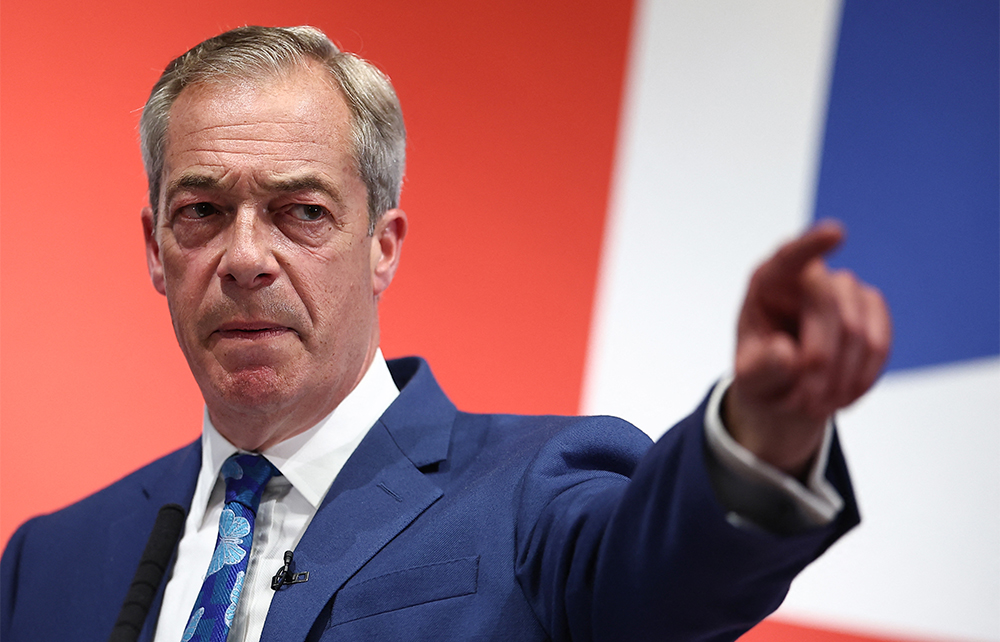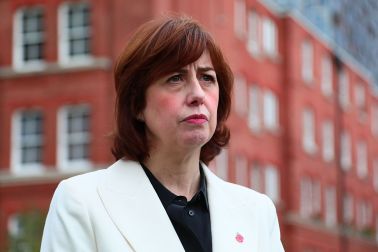Arriving on stage to accept ‘Newcomer of the Year’ at The Spectator’s Parliamentarian of the Year awards, Nigel Farage gave a warning to the Westminster establishment. ‘I’ve got a bit of a shock for you,’ he said. ‘If you think that I and four other people – the newcomers into parliament this year in the general election – were a shock, I’m very sorry but at the next election in 2029 or before, there will be hundreds of newcomers under the Reform UK label.’
He added: ‘We are about to witness a political revolution the likes of which we have not seen since Labour after the first world war. Politics is about to change in the most astonishing way. Newcomers will win the next election. Thank you very much.’
‘I think about Nigel
Farage a lot,’ says one
government figure
While many of the attendees laughed off Farage’s claims and went back to their wine, he had hit on an acute concern in Downing Street. As Keir Starmer struggles to get a grip on government, some in Labour are anxious that his shortcomings could see voters move to the right. ‘An anti-politics mood is spreading across the country,’ says a minister.
Ahead of the election, Labour aides said that they would face one of the toughest inheritances in living memory. Five months in, most of the party still can’t quite believe how badly it has gone. ‘I’m not panicking yet,’ says one aide. ‘But I might soon.’ The Prime Minister ends the year with collapsing approval ratings, a fall in business confidence and his first cabinet resignation in the form of Louise Haigh, who stood down following the revelation that she had a fraud conviction (which Starmer knew about).
In a sign of the increasingly febrile mood in the Labour party, Haigh’s exit is being viewed as suspicious by parts of the Labour left. ‘They never accepted Louise, she was an odd fit,’ says a party figure. ‘It’s all very convenient.’ Another source points to the fact that Haigh, who represents the soft left, had protested about spending cuts ahead of the Budget as a reason why Downing Street may be breathing a sigh of relief that she is out. She has been replaced with the Starmer loyalist Heidi Alexander. ‘Morgan McSweeney is a Stalinist without the left-wing bits,’ says one Labourite, referring to Starmer’s chief of staff. Downing Street strongly denies any foul play, of course.
There is, however, cautious optimism in 10 Downing Street that things can be turned around. The Prime Minister has time on his side. In No. 10, many of the problems to date have been blamed on the last chief of staff, the career civil servant Sue Gray. She is accused by her former colleagues of messing up the preparations for government and denying Starmer a clean start. Rumours that Gray is still in line for a peerage are landing badly with Labour staffers.
With McSweeney, Starmer’s long-standing aide, now in the role, a series of events are planned to get the government back on the front foot. The first is Starmer’s speech on his government’s priorities. This has been widely branded as a ‘reset moment’, yet Downing Street aides erupt at the mention of the r-word. ‘It’s not a reset,’ says one senior government figure. ‘How can an event that’s been in the diary for months be a reset?’ Either way, the idea is to turn the government’s ‘missions’ from broad concepts underlying its aims – on living standards and NHS waiting lists, for instance – into clear goals for Whitehall.
Ministers believe such goals are achievable if the state is reformed. That will be an uphill endeavour. ‘This country is on a downward trajectory,’ says a government aide. ‘We need to reverse that.’
It all feels a little familiar. Didn’t Rishi Sunak try to turn the tide on his party’s fortunes by bringing in tangible goals – his ‘five priorities’? They quickly became an albatross around his neck. When Sunak made progress on one target, it was seen as small when set against his failures on the others. But Starmer’s allies say it’s different for him. ‘We have four years to get this done,’ says a government figure. ‘Rishi had to make a desperate attempt as he had no time.’
Next comes the spending review, which is due in June. An official launch is expected in the coming weeks. Rather than wait for leaks or letters, Chancellor Rachel Reeves wants to get ahead of the agenda and set out what the government plans to achieve. The promise of reform will be a necessary accompaniment to any spending requests. Ministers already think the Treasury exerts too much political power. The vacuum in No. 10 in the beginning of the government meant much of the politics fell to No. 11. ‘We’ve basically been governed by Treasury civil servants for three months,’ says a Labour MP – pointing to Starmer and Reeves’s decision to enact a series of policies known to be favoured by Treasury officials, from cutting winter fuel to the crackdown on inheritance on land.
Could the new Cabinet Secretary change that? Simon Case was this week replaced by Chris Wormald – who was previously permanent secretary at the Department of Health and Social Care. Wormald beat candidates including Olly Robbins, the former Brexit negotiator, to the job. In Whitehall, he is viewed as a safe pair of hands – even if he lacks some of the flair of his rivals.

Yet there are already signs that more joined-up thinking is needed. The week Reeves appointed a new Covid corruption officer, Starmer made the man who is likely to have had oversight on many of the pandemic contracts his top sherpa. Wormald lacks foreign policy experience, but the idea is that Jonathan Powell, Tony Blair’s former chief of staff, will make up for this in his role as national security adviser. Powell played a key role in the controversial Chagos Islands deal, however, so the jury is out on him.
All this points to wider concerns in government. Ministers are struggling to bend the machine to their will. ‘You realise that you need to not ask civil servants for their advice, but tell them what you want,’ says a government aide. Labour high-ups are aware that if they don’t succeed, the Reform party leader’s prophecy may well come true.
‘I think about Nigel Farage a lot,’ says a government figure. ‘It’s not impossible he is in government in a few years.’ So Starmer’s attempted reset isn’t just about his own fortunes. It’s about what happens if the whole left-wing project fails.








Comments